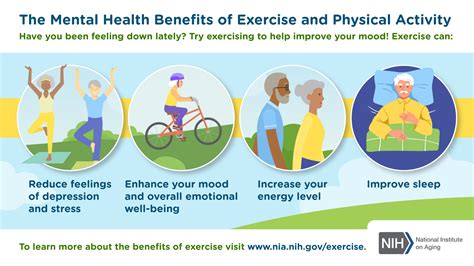Discovering the untapped potential of your mind and body is a journey that often starts with a single step. The recognition of the interconnectedness of physical and emotional well-being has paved the way for an increasingly popular approach to holistic health - exercise. Engaging in regular physical activity not only revitalizes your body but also has a profound impact on your state of mind.
Exercise, in all its forms, possesses the remarkable ability to unlock a plethora of mental benefits that can enhance your overall emotional well-being. As you carve out time from your busy schedule to dedicate to physical activity, you are investing in an unspoken collaboration between your mind and body. By enlivening your muscles, heart, and lungs, you are simultaneously providing your brain with the nourishment it craves.
Step into the world of endorphins - the natural feel-good chemicals produced by your body during exercise. These neurotransmitters act as a powerful antidote to stress, anxiety, and depression. With every vigorous motion and heart-pumping stride, your body releases a burst of these euphoric substances, infusing you with a renewed sense of vitality and contentment. As you push your limits, you will witness the remarkable transformation of your mood, as if dark clouds parting to reveal the sunniest of skies.
How Regular Physical Activity Can Enhance Your Emotional Well-being

Engaging in regular physical activity offers a multitude of benefits beyond just improving your physical health. It has the potential to positively impact your mood and emotional well-being. By incorporating exercise into your daily routine, you can experience an overall enhancement in your mental state.
1. Release of Feel-Good Hormones: Physical activity stimulates the production of endorphins, commonly known as "feel-good hormones." These hormones can help alleviate stress, anxiety, and depression, ultimately boosting your mood.
2. Reduction of Stress and Anxiety: Regular exercise can act as a natural stress reliever. It helps to reduce the levels of stress hormones in your body, while also increasing the production of neurotransmitters that promote relaxation and calmness.
3. Enhanced Self-esteem: Engaging in physical activity regularly can significantly improve your self-esteem and self-confidence. As you become stronger and more physically fit, you may experience a sense of achievement and pride, leading to an overall positive outlook on life.
4. Better Sleep Quality: Regular exercise can contribute to better sleep patterns. It helps regulate your sleep-wake cycle and promotes deeper, more restful sleep. Improved sleep can have a profound impact on your mood, energy levels, and overall well-being.
5. Social Interaction and Support: Participating in group exercises or sports activities can provide opportunities for social interaction and support. Connecting with others who have similar fitness goals and interests can foster a sense of belonging and improve your mood through shared experiences.
Remember, incorporating regular physical activity into your routine doesn't have to be complicated or time-consuming. Even small steps like taking a brisk walk, dancing, or practicing yoga can make a significant difference in improving your mood and emotional well-being.
- Regular exercise stimulates the release of feel-good hormones, such as endorphins, which can help uplift your spirits and alleviate negative emotions.
- Physical activity acts as a natural stress reliever, reducing the levels of stress hormones in your body and promoting relaxation.
- Engaging in regular exercise can enhance your self-esteem and self-confidence, leading to a more positive outlook on life.
- Exercise contributes to better sleep quality, promoting deeper, more restful sleep and influencing your overall mood and energy levels.
- Participating in group exercises or sports activities provides social interaction and support, fostering a sense of belonging and improving your mood through shared experiences.
The Connection Between Physical Activity and Reduced Stress
Engaging in regular physical activity has been found to have a significant impact on reducing stress levels. Research has shown a clear link between physical activity and a decrease in stress-related symptoms, providing individuals with an effective means of managing and alleviating the pressures of daily life.
When we engage in physical activity, our bodies release endorphins, which are known as "feel-good" hormones. These endorphins act as natural stress relievers, helping to boost our mood and improve our overall sense of well-being. Regular exercise also helps to increase blood flow and oxygen circulation to the brain, which can enhance cognitive function and reduce symptoms of anxiety and depression.
Furthermore, physical activity provides a healthy outlet for pent-up emotions and energy. Whether it's going for a run, taking a yoga class, or participating in team sports, engaging in exercise allows individuals to redirect their focus and energy in a positive way. This can greatly reduce feelings of tension, frustration, and irritability, leading to a greater sense of calm and relaxation.
In addition to the physical benefits, participating in regular physical activity also allows individuals to take time for themselves and engage in self-care. Exercise provides a break from the demands of daily life and serves as a form of escape. It allows individuals to disconnect from their worries and responsibilities, offering a respite from the constant mental stimulation and stressors that we often encounter.
In summary, the correlation between physical activity and reduced stress is undeniable. Engaging in regular exercise not only improves our physical health but also provides a powerful tool for managing and reducing stress levels. By incorporating physical activity into our daily routines, we can reap the numerous benefits for both our body and mind, ultimately leading to a healthier and happier life.
Exercise as a Natural Antidepressant: Understanding the Science

Exploring the fascinating relationship between physical activity and emotional well-being, this section delves into the scientific basis behind exercise's natural antidepressant effects.
Discovering the inherent connection between physical exertion and mental health, this section uncovers the mechanisms through which exercise influences our mood and helps combat depressive symptoms.
Examining the biochemical processes at play, this section elucidates the role of neurotransmitters, such as dopamine and serotonin, in the brain's response to exercise, shedding light on why physical activity can often elicit feelings of happiness and tranquility.
Unveiling the impact of exercise on neural plasticity, this section elucidates how regular physical activity promotes the growth and development of brain cells, contributing to improved cognitive function and resilience against mental health challenges.
Explaining the role of endorphins, this section uncovers how these natural chemicals, released during exercise, act as potent analgesics and mood enhancers, providing a natural boost to overall well-being and emotional stability.
Detailing the synergy between exercise and stress reduction, this section explores the relationship between physical activity and cortisol levels, revealing how regular workouts can lower stress hormone levels and alleviate anxiety and depression.
Exploring the influence of exercise on neurotrophic factors, such as brain-derived neurotrophic factor (BDNF), this section examines how these molecules play a crucial role in promoting neuroplasticity and resilience against psychiatric disorders.
Understanding the science behind exercise as a natural antidepressant provides valuable insight into the profound impact physical activity can have on mental health, paving the way for innovative treatment approaches and emphasizing the importance of incorporating exercise into mental health care.
Enhancing Cognitive Function with Physical Exercise
Exercise has the potential to improve and optimize mental abilities by stimulating cognitive function. Engaging in physical activity not only benefits the body but also boosts cognitive processes, leading to enhanced mental performance and overall brain health.
When individuals partake in regular physical exercise, their cognitive abilities receive a significant boost. Research suggests that exercise promotes the growth of new neurons in the hippocampus, a region of the brain crucial for memory and learning. Additionally, physical activity increases blood flow to the brain, delivering a higher oxygen supply and essential nutrients, which are vital for optimal brain function.
Furthermore, physical exercise triggers the release of neurotransmitters, such as endorphins and serotonin, commonly known as "feel-good" chemicals. These neurotransmitters play a key role in regulating mood, reducing stress, and improving overall mental well-being.
Engaging in moderate-intensity aerobic activities, such as brisk walking or cycling, has been linked to improved cognitive performance. These activities stimulate the release of a protein called brain-derived neurotrophic factor (BDNF), which promotes the growth and development of neurons, crucial for enhancing cognitive function.
In addition to aerobic exercise, incorporating strength training into one's routine can further enhance cognitive abilities. Strength training activates areas of the brain associated with cognitive function and executive control, leading to improved attention, decision-making, and problem-solving skills.
| Benefits of Exercise for Cognitive Function: |
| 1. Improved memory and learning abilities |
| 2. Increased blood flow to the brain |
| 3. Enhanced mood and reduced stress |
| 4. Stimulation of neuronal growth and development |
| 5. Improved attention and executive control |
Exercise and Anxiety: Discovering Relief through Movement

Exploring the profound impact of physical activity on our emotional well-being, this section delves into the vital connection between exercise and anxiety. By engaging in various forms of movement, individuals can uncover a powerful avenue for alleviating the burdensome weight of anxiety without relying solely on traditional methods.
Unveiling the positive effects:
Regular physical exercise has been proven to be a potent antidote for anxiety, offering a multitude of benefits that extend beyond just physical health. Delving into the intricate workings of the mind, exercise fuels the release of endorphins, commonly known as "feel-good" hormones. These natural chemicals act as a shield, bolstering mental resilience and alleviating anxiety symptoms.
Discovering a sanctuary through movement:
Mindfully choosing to embrace physical activity creates a safe haven where individuals can momentarily escape the grip of anxiety. Whether it's a brisk walk in nature, an invigorating dance class, or a stress-relieving yoga session, the act of movement allows individuals to immerse themselves in the present moment, shifting the focus away from anxiety-inducing thoughts and providing a much-needed reprieve.
Empowering the mind and body:
Engaging in regular exercise not only strengthens the body but also cultivates a resilient mindset. By overcoming physical challenges, individuals garner a sense of accomplishment, fostering increased self-confidence, and empowering the mind to better cope with anxiety. This newfound resilience acts as a buffer against the debilitating effects of anxiety, gradually diminishing its hold on one's well-being.
In conclusion, exercise emerges as an invaluable tool for individuals grappling with anxiety. The act of movement not only provides relief by triggering the release of endorphins but also creates a sanctuary for the mind, offering a reprieve from anxiety-inducing thoughts. By embracing physical activity, individuals can strengthen both their bodies and minds, ultimately gaining the upper hand in their battle against anxiety.
The Long-Term Advantages of Physical Activity for Cognitive Well-being
When evaluating the enduring effects of engaging in regular physical activity for our mental well-being, it becomes apparent that the advantages extend far beyond the realm of immediate psychological benefits. Long-term commitment to exercise can bring about substantial improvements in various aspects of our cognitive health, enhancing our overall quality of life.
Engaging in consistent physical activity has the potential to positively influence our mental well-being in the long run by nurturing aspects such as cognitive function, emotional stability, and resilience. Physical exercise activates and stimulates the brain, promoting the growth of new neurons and strengthening existing connections, particularly in regions responsible for cognitive processes. This neurological enhancement translates into improved cognitive abilities, including enhanced memory, sharper focus, and increased mental clarity.
Moreover, regular exercise aids in the production of beneficial substances in the brain, such as endorphins and neurotransmitters, which play significant roles in mood regulation and stress reduction. These natural chemicals contribute to an increased sense of emotional balance, fostering a more resilient mindset when faced with challenging circumstances. Additionally, exercise can serve as a powerful coping mechanism, providing individuals with an outlet for stress and anxiety, and ultimately promoting a greater sense of well-being.
The long-term effects of exercise on mental health extend beyond cognitive and emotional aspects, influencing vital aspects of our overall well-being. Regular physical activity has been found to be associated with reduced risk of developing mental health disorders and conditions such as depression and anxiety. Furthermore, exercise can play a critical role in mitigating the decline in cognitive function associated with aging, potentially contributing to a lower risk of developing neurodegenerative diseases, such as Alzheimer's and dementia.
In conclusion, committing to regular physical activity is not only a means of enhancing immediate mental well-being, but also an investment in our long-term cognitive health. By engaging in exercise, we can reap the multitude of benefits it provides, including improved cognitive function, emotional stability, and a reduced risk of mental health disorders. The long-term advantages of exercise on mental health highlight the holistic impact it can have on our overall well-being and emphasize the importance of incorporating physical activity into our daily lives.
FAQ
How does exercise help improve mental health?
Exercise is known to release endorphins, which are neurotransmitters that help improve mood and reduce stress and anxiety. It also promotes better sleep, boosts self-esteem, and increases brain function, all of which contribute to improved mental health.
Is there a specific type of exercise that is more effective for boosting mental health?
Any form of exercise can be beneficial for mental health, but studies have shown that aerobic exercises, such as running, swimming, or cycling, tend to have a greater impact on improving mood and reducing symptoms of depression and anxiety.
How often should I exercise to see the mental health benefits?
To experience the mental health benefits of exercise, it is recommended to engage in moderate-intensity aerobic exercise for at least 150 minutes per week, or vigorous-intensity aerobic exercise for at least 75 minutes per week. This can be divided into shorter sessions throughout the week.
Can exercise help with specific mental health conditions?
Exercise has been shown to be beneficial for a variety of mental health conditions. For example, it can help reduce symptoms of depression and anxiety, improve ADHD symptoms, alleviate stress, and boost cognitive function in individuals with dementia or Alzheimer's disease. However, it should not replace professional treatment and therapy.
Are there any precautions or considerations to keep in mind when using exercise as a way to boost mental health?
While exercise is generally safe and beneficial for mental health, it is important to listen to your body and not overexert yourself. It is also advisable to consult with a healthcare professional, especially if you have any underlying health conditions or are taking medications that may interact with exercise. Additionally, finding enjoyable activities and setting realistic goals can help maintain motivation and prevent burnout.



